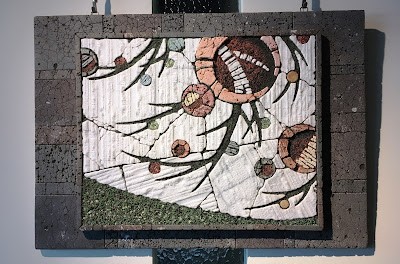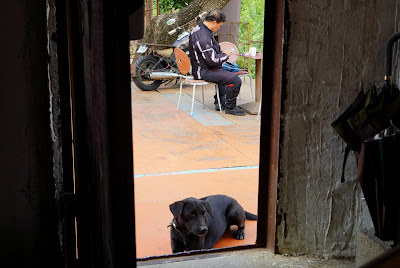2020年12月31日 星期四
很冷很冷的一天,我們來此 . . .
2020年12月30日 星期三
妙香園的回憶
2020年12月27日 星期日
The Christmas Story Retold in Different Ways
for the 1st Sunday after Christmas
The Christmas Story Retold in Different Ways
I.
Introduction:
Merry
Christmas! -- Merry Christmas to all of you …
In this special
season, a season for us to further experience the hope, peace, joy and love from the Lord, I’d like to let you know that something special
just happened to my family. As you may have known, my dear mother passed away
one and a half weeks ago, on December 16, and all my brothers and sisters and I
(as well as our family) have been feeling down – having “mixed feelings” these
recent days.
But let me
thank you for your prayer and comfort. Your comforting words can warm up our
hearts and give us strength to face and overcome our loss. And I wish to
express my gratitude to Rev. Lily Chang, who’s helping us to plan the funeral
that will be held about 10 days from now.
In these
past weeks, Jean and I never forgot all the help from you, our best neighbor. And we didn’t forget the grace
and love from God. At least I have two things to say: (1) my mother was
baptized on November 9, during her stay in the nursing home in Dali. How
amazing that was! – Praise the Lord! (2)
In the very last week when my mother had to be in hospital, with the hospital’s
help we hired a professional caregiver (專業看護) to take care of her day and night. We couldn’t
pick and choose our caregiver, but the one that came to us was a Christian
woman, of Amis (阿美族/基督徒). What a
perfect angel for my mother! – Thanks to the
Lord!
Another
thing I want to say is that in these past few weeks my brothers and sisters – I
have 3 brothers and 4 sisters, all of them younger than me – In this special
period, every time some/most of us got together, we would chat about our
childhood, about those “good and bad” old days, and we would recall (and share with
one another) some particular stories – real stories; some of the stories are
about what had happened to us all – they are so-called “family stories” or known
as “stories in common.”
II.
The Christmas Story Told in
Different Ways:
It’s quite
interesting that the same event could be put into different stories … and
members of the same family might possibly tell the same story in different
ways; more precisely, there may be different versions of the same story!
Now think
about the first 18 verses of John’s Gospel (which we just heard). This is the
Christmas story, the third time the Bible tells it. It is the same story we may
have heard on Christmas Eve – the story of the manger and the shepherds
and the angels
– and it’s the same story Matthew tells in his gospel – with Joseph’s dreams,
the wise men and the flight to Egypt. But the point of view is
different, and John’s Gospel sounds strange to ears more accustomed to crowded inns and angel
choirs. That’s because different folks in the family are telling the same
story.
You see,
Luke was a bit of a historian. He wrote the familiar story of Christmas Eve. He
was very concerned with getting the dates and
rulers right, and with locating everything
in time and space. Also, he was very concerned about the role of people
who were considered outsiders. So, Luke is more concerned with shepherds
(who were social outcasts) than about kings.
Matthew is
more traditional. He was a Jew and may have been a scribe. He was very
concerned with making it clear that Jesus fulfilled all of the Old Testament
prophecies as Messiah, King of Jews. He paid a lot of attention to the flight
to Egypt because of the parallel
between the Exodus led by Moses and Jesus’ own return from Egypt to Israel.
But John
(author of the 4th Gospel) is a theologian and a mystic. So, he isn’t
concerned with historical details. Instead, he writes of the meaning of
Jesus’ birth, and he writes from his
theology, and from the holy imagination
of his prayers. But he is still telling the same story – all three are
talking about the same birth – all three are saying the same thing.
John reminds
us that Christmas really begins where Genesis begins – in the beginning, with
God in creation. He talks about the Word of God. “The Word” here is God in
action, God creating, God revealing himself. The Word was with God, and the Word was God.
Then he tells the Christmas story, saying, “The
Word became flesh and lived among us.” He who was with God in creation, the
one who is God revealing himself to humanity – this one became a person, became
flesh – as completely human as you and I. This very person was the Word; he was
God’s own self.
In theology,
this is the concept of Incarnation: The
Word became flesh (道成肉身). Is it too hard for us to understand right here?
III.
The Story of Where Love
Is, God Is:
Never mind. To make it easily understood, I’d like
to retell the story “Where Love Is, God Is.”
That’s a short story written by the Russian author Leo Tolstoy (托爾斯泰). It has another English title – Martin the Cobbler (or Shoemaker), translated into Chinese as “鞋匠馬丁的故事”.
The full name of Martin is Martin Avdeitch [`ɑvditʃ]. He was an excellent shoemaker. He stayed busy with his work in his
basement which had only one window. Through the window he could see only the
feet of people. But he was able to recognize most people by their shoes,
because he had worked with those shoes at least once.
Martin had a wife, but she died, and all their
children had died in their infancy except a three-year-old son. Martin decided
to take good care of the child himself; however, he was not destined to have a
child as his son died a few years later with a fever. – Being so sad, Martin denied
God, wondering how He could allow such a thing to happen to him.
One day a missionary visited Martin and Martin
told him of his hardships. The missionary told Martin that he should live his life for God and not deny Him because God’s
will is the ultimate deciding factor and as humans we cannot question
that. The missionary’s words sank deep into Martin, so he began to read the
Bible.
As he read more and more of it, his life became
full with peace and joy. One night Martin read a passage about a Pharisee who had invited Jesus into his
house, and in the house a woman anointed and washed Jesus’ feet with her
tears. Martin thought of himself as the Pharisee in that story as he was only living for himself. As Martin slept he thought
he heard the voice of God telling him that He would visit him the next day.
The next morning Martin skeptically watched out
his window for God. While he was searching for God he saw Stepanitch [`stipənɪtʃ] shoveling away snow. Stepanitch was an old man working as a “street
sweeper” (年紀老邁的清道夫). Martin
invited him in for a warm drink (a cup of hot coffee?) and they talked for a
while. Martin told Stepanitch about Jesus and the Pharisee, and Stepanitch was deeply
moved. As Stepanitch left he thanked Martin for the food – both for the soul
and body.
Martin later saw a young woman outside with a baby
not properly dressed for the cold. He invited her in for some food and gave her
warmer clothes and money. Martin also told her about Jesus and she thanked him
and left. -- Then he saw a young boy stealing from an older lady. He went
outside and settled their argument as he extended love and compassion toward
the both of them.
That night while Martin wondered why God had not
visited him, the three figures appeared in his home (whom he had showed
hospitality to that day). They said that when he helped them he was helping
God. Martin then realized that God had indeed visited him, and he accepted Him
well.
IV.
Conclusion:
The
story of Martin the Shoemaker would remind
us of what our Lord said (in Matthew 25:35-40):
35 I was hungry and you fed me, thirsty and you gave me a drink; I
was a stranger and you received me in your homes, 36 naked
and you clothed me; I was sick and you took care of me, in prison and you
visited me.’ 37 The righteous will then answer him,
‘When, Lord, did we ever see you hungry and feed you, or thirsty and give you a
drink? 38 When did we ever see you a stranger and
welcome you in our homes, or naked and clothe you? 39 When
did we ever see you sick or in prison, and visit you?’ 40 The
King will reply, ‘I tell you, whenever you did this for one of the least
important of these followers of mine, you did it for me!’ (GNT, Good News Translation)
Remember, these words are closely
related to the theological concept of Incarnation; and just like the wonderful poetry
of the first 18 verses of John’s Gospel, which tells the same Christmas story in
another way, I’d like to conclude my sermon today by saying that the Word has become flesh and is living among us,
and that where love is, there God is also. Amen.


































































